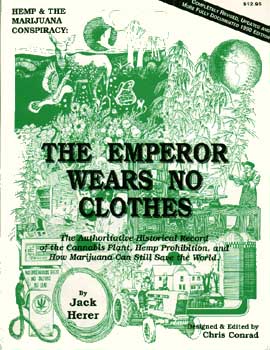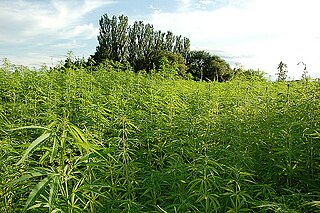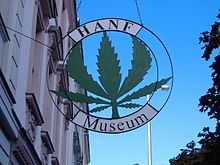
Cannabis is a genus of flowering plants in the family Cannabaceae. The number of species within the genus is disputed. Three species may be recognized: Cannabis sativa, C. indica, and C. ruderalis. Alternatively, C. ruderalis may be included within C. sativa, all three may be treated as subspecies of C. sativa, or C. sativa may be accepted as a single undivided species. The genus is widely accepted as being indigenous to and originating from Asia.

Hemp, or industrial hemp, is a botanical class of Cannabis sativa cultivars grown specifically for industrial or medicinal use. It can be used to make a wide range of products. Along with bamboo, hemp is among the fastest growing plants on Earth. It was also one of the first plants to be spun into usable fiber 50,000 years ago. It can be refined into a variety of commercial items, including paper, rope, textiles, clothing, biodegradable plastics, paint, insulation, biofuel, food, and animal feed.

Cannabis, also known as marijuana among other names, is a psychoactive drug from the cannabis plant. Native to Central or South Asia, the cannabis plant has been used as a drug for both recreational and entheogenic purposes and in various traditional medicines for centuries. Tetrahydrocannabinol (THC) is the main psychoactive component of cannabis, which is one of the 483 known compounds in the plant, including at least 65 other cannabinoids, such as cannabidiol (CBD). Cannabis can be used by smoking, vaporizing, within food, or as an extract.

The Emperor Wears No Clothes is a non-fiction book written by Jack Herer. Starting in 1973, the story begins when Herer takes the advice of his friend, "Captain" Ed Adair, and begins compiling tidbits of information about the cannabis plant and its numerous uses, including as hemp and as a drug. After a dozen years of collecting and compiling historical data, Herer first published his work as The Emperor Wears No Clothes, in 1985. The twelfth edition was published in November 2010, and the book continues to be cited in Cannabis rescheduling and re-legalization efforts.

Cannabis flower essential oil, also known as hemp essential oil, is an essential oil obtained by steam distillation from the flowers, panicles, stem, and upper leaves of the hemp plant. Hemp essential oil is distinct from hemp seed oil and hash oil: the former is a vegetable oil that is cold-pressed from the seeds of low-THC varieties of hemp, the latter is a THC-rich extract of dried female hemp flowers (marijuana) or resin (hashish).

Mathias Bröckers is a German journalist, publicist, political blogger and author, co-author or editor of political monographs, and novels. He was co-founder, culture and science editor of the taz, and from 2006 its online consultant. He worked as a columnist for Die Zeit and Die Woche and as a science editor for ARD radio.

The Hanfparade is a hemp legalization demonstration in Berlin. It has taken place each year in August since 1997.

Cannabigerol (CBG) is one of more than 120 identified cannabinoid compounds found in the plant genus Cannabis. Cannabigerol is the decarboxylated form of cannabigerolic acid, the parent molecule from which other cannabinoids are synthesized.
The plant name Cannabis is derived originally from a Scythian or Thracian word, which loaned into Persian as kanab, then into Greek as κάνναβις and subsequently into Latin as cannabis. The Germanic word that gives rise to English hemp may be an early Germanic loan from the same source.

Cannabis culture describes a social atmosphere or series of associated social behaviors that depends heavily upon cannabis consumption, particularly as an entheogen, recreational drug and medicine.

Cannabis in Switzerland is illegal, though minor possession was decriminalised to a fine in 2012. Several cantons began to allow adults to cultivate and use cannabis in 2012, but this was struck down by federal courts. In 2016, four cities stated they were looking into establishing pilot cannabis clubs. The number of cannabis users in Switzerland is estimated to be around 500,000 among a population of 8 million.

A cannabis shop, cannabis dispensary, or cannabis cooperative, is a location at which cannabis is sold for recreational or medical use. In the Netherlands these are called coffeeshops. In the United States they exist as an outlet for both recreational and medical use. These shops differ from head shops in that the latter sells only drug paraphernalia. In 2015, the City of San Diego made A Green Alternative the first licensed medical cannabis dispensary and delivery service in the city. The world's largest cannabis dispensary is in Las Vegas, Nevada at 112,000 square feet opened by Planet 13 Holdings.

Cannabis in Germany is legal for certain limited medical contexts, but illegal for recreational usage, though possession of minor amounts is not always prosecuted. As of 2022, approximately 4 million adults in Germany use cannabis.
Cannabis in Italy is currently legal for medical and industrial uses, although it is strictly regulated, while it is decriminalized for recreational uses. In particular, the possession of small amounts of marijuana for personal use is a civil infraction. The possible sanctions for possession vary from the issuing of a diffida to first offenders, that is an injunction not to use the drug again; to the temporary suspension of certain personal documents for repeat offenders. Conversely, the unauthorized sale of cannabis-related products is illegal and punishable with imprisonment, as is the unlicensed cultivation of cannabis, although recent court cases have effectively established the legality of cultivating small amounts of cannabis for exclusively personal use. The licensed cultivation of cannabis for medical and industrial purposes requires the use of certified seeds; however, there is no need for authorization in order to plant certified seeds with minimal levels of psychoactive compounds.
The list includes and details significant events that occurred in the global history of national-level implementations of, or changes made to, laws surrounding the use, sale, or production of the psychoactive drug cannabis.

Cannabis has served as an entheogen—a chemical substance used in religious or spiritual contexts—in the Indian subcontinent since the Vedic period dating back to approximately 1500 BCE, but perhaps as far back as 2000 BCE. It was introduced to the New World by the Spaniards in 1530-1545. Cannabis has been used by shamanic and pagan cultures to ponder deeply religious and philosophical subjects related to their tribe or society, to achieve a form of enlightenment, to unravel unknown facts and realms of the human mind and subconscious, and also as an aphrodisiac during rituals or orgies. There are several references in Greek mythology to a powerful drug that eliminated anguish and sorrow. Herodotus wrote about early ceremonial practices by the Scythians, thought to have occurred from the 5th to 2nd century BCE. Itinerant Hindu saints have used it in the Indian subcontinent for centuries. Mexican-Indian communities occasionally use cannabis in religious ceremonies by leaving bundles of it on church altars to be consumed by the attendees.

Spannabis is an annual cannabis event held in Spain that has been held in Barcelona since 2002. It is the biggest cannabis event in Europe.

The history of cannabis and its usage by humans dates back to at least the third millennium BC in written history, and possibly as far back as the Pre-Pottery Neolithic B based on archaeological evidence. For millennia, the plant has been valued for its use for fiber and rope, as food and medicine, and for its psychoactive properties for religious and recreational use.
The Association of Swiss Hemp Friends, better known as Verein Schweizer Hanf-freunde (VSFH) or ASAC, is an organization situated at St Gallen, Switzerland known for its functioning and operation towards legalization of free cultivation, consumption, personal, medicinal usage and commercial exchange of hemp herb (cannabis) in contrast to any narcotic usage. The organization is also known to advocate the farming of hemp plants by providing supports to the farmers and peasants as the efforts to make agricultural usage of hemp sustainable under prevailing governmental regulations about cannabis usage.














